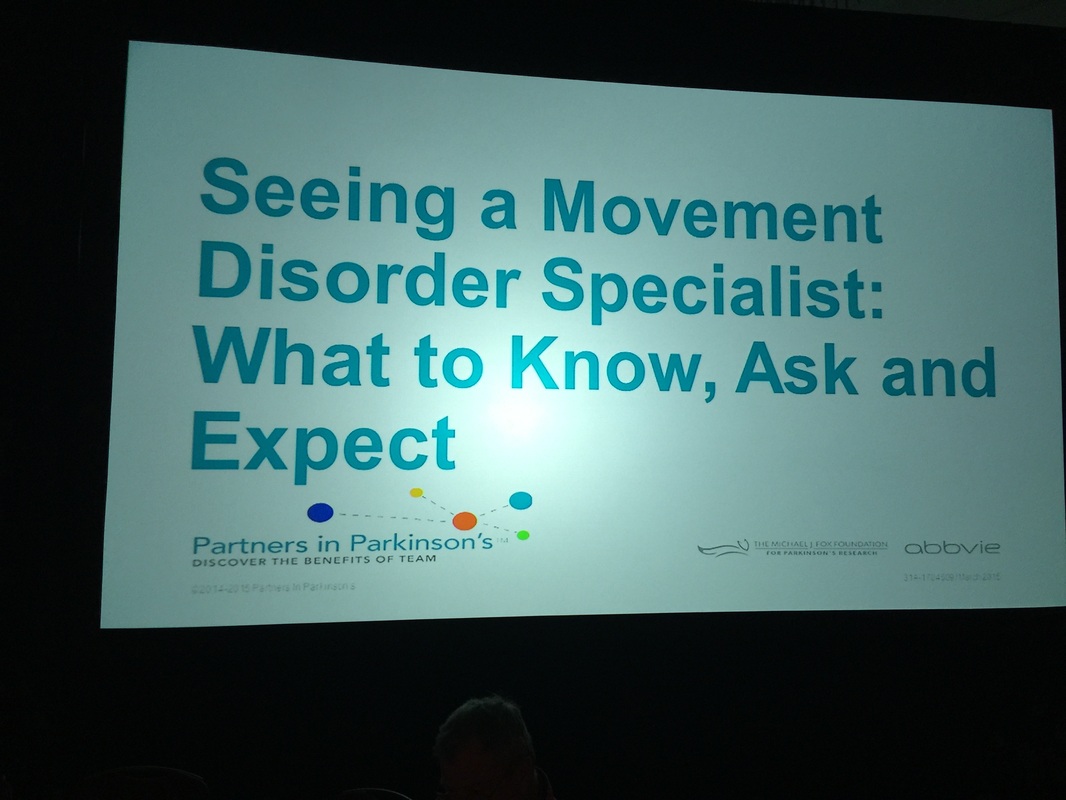|
Dean P. Sutherland, MD, PhD, Founder of the Southeastern Center for Parkinson Disease and Medical Director for Neuro Challenge Foundation for Parkinson's in Sarasota, Florida presented a session for 1,600 Parkinson patients and their caregivers live and via webcast today at the Michael J Fox Partners in Parkinson Conference in Tampa on the topic of "What to Expect At An Appointment With A Parkinson Specialist." Nearly two additional hours were devoted to answering questions from patients from around the area. Robert Hauser, MD, MBA, Professor of Neurology and Director of the USF Health Burd Parkinson's Disease and Movement Disorders Center of Excellence and Christopher Hess, MD, Assistant Professor of Neurology at the UF Center for Movement Disorders and Neurorestoration presented the latest in Parkinson research.
Partners in Parkinson's heads to Tampa to provide a full day of educational seminars and panel discussions. Dr. Dean P. Sutherland will be a presenter at the conference, providing information about what to expect and how to be prepared for your doctor's appointment. There's no one better to hear this information from! He sees more Parkinson's patients than any doctor in the region!
Much research has been done on the relationship between specialization, high volume treatment and improved patient outcomes. This research shows that doctors with the most experience in treating your condition tend to have the best results. Dr. Dean P. Sutherland, MD, PhD at the Southeastern Center for Parkinson Disease and Sarasota Memorial Health Care System treats more patients diagnosed with Parkinson’s Disease annually than any other doctor in America according to records released by Medicare and insurance company data compiled by Amino.com between 2012-2015. Patients with Parkinson’s Disease deserve experienced, innovative and compassionate care. Support Dr. Sutherland’s Parkinson work at neurochallenge.org or call 941-926-6413 for more information.
1. It has been said that accurate genetic diagnosis and treatment will occur along with increased knowledge of the genetic code. Many of you want to know the probability of passing PD along to your children and grandchildren. The vast majority of people with Parkinson’s do not have mutated genes and therefore do not pass them along.
2. Evidence suggests that exposure to some pesticides and solvents, farming, rural living and well water is linked to Parkinson’s disease. 3. The ingestion of cocoanut oil, cinnamon, Omega-3 fish oil,pure oxygen, Vitamin C and E, Glutathione, CoQ-10, nicotinamide, riboflavin, acetlyl carnitine, lipoic acid, St. John’s Wort, Ginko Biloba, creatine, and Alkaline water, have not yet been shown in scientific, peer-reviewed studies to be beneficial to Parkinson’s patients. In part, this may be due to inadequate research, so we encourage you to participate in trials where available. 4. Don’t be vulnerable to clinics claiming to provide stem cell-based cures. This therapy is still years away. Again, participate in trials when they become available. 5. The largest clinical trial of the three types of Parkinson drugs, studying 1,620 patients, finds Levodopa therapy is the most effective initial treatment. Read: Newer is not always better. 6. The use of a placebo in a clinical trial can affect how the participant perceives the trial drug’s effectiveness.Called the “lessebo” effect, patients who perceive the likelihood of receiving a placebo as less than average judge the effects of the trial drug to be more effective (and vice versa). This supports the idea that, in the early stages ofParkinson’s, the more a patient believes a therapy will work the more he or she will perceive that it is working. Maybe that’s why people use glutathione regardless of evidence to the contrary? 7. Cardiovascular problems may play a role in increasing the rate of motor disability in PwPs. The negative effects of elevated blood pressure on neurodegeneration, for instance, are well documented in dementia and the same may prove true in PD. Improving your cardio risk factors could be a unique approach to modifying PD and reducing gait and balance difficulties, researchers say. Cardio problems often go hand in hand with PD and a cardiologist should be consulted when necessary. 8. Depression is very much a part of the disease process of Parkinson’s and is not to be taken lightly by either the caregiver or the patient. Sometimes it is a precursor to other symptoms but it can appear at any time. In fact, more than half of PwPs are thought to experience depression at some point. Depression is characterized by a change in the way you interact with friends and relatives, a disinterest in things you once enjoyed, a feeling of hopelessness, fatigue, losing or gaining weight, sleep changes, anger, self loathing and reckless behavior. You may have only one or two of these symptoms and if you do, I can assure you there is no shame.It’s not your fault and it isn’t indicative of some personal failing. Talk to your doctor immediately because he or she can prescribe a number of medications and treatments that will provide relief. A neuropsychiatric specialist can also be consulted. 9. Anxiety is characterized by feelings of panic, fear or uneasiness, problems sleeping, cold or sweaty or numb/tingling hands or feet, shortness of breath, heart palpitations, an inability to be still or calm, or dry mouth. Again, your doctor can help you manage your anxiety. 10. In a 2007 study published in Movement Disorders, researchers found that pulmonary dysfunction occurred in patients with PD, even in early stages. Women with rigidity were particularly susceptible. Upper airway obstruction may be significant in PD and can worsen during sleep resulting in sleep apnea. Tests that measure how well your lungs are functioning, breathing exercises and regular chest physiotherapy is recommended for all PwPs. Levadopa is likely to reduce breathing difficulties in some but not all patients. A pulmonologist can be consulted if necessary. Written by Doreen T. Sutherland, MBA After many months of waiting, two new medications have become available to people with Parkinson's disease. Rytary is a new slow-release levodopa formulation that will be very helpful to patients who are taking medications multiple times per day. For instance, some people have to take Sinemet every two hours or so, up to seven times per day. With Rytary, they may be able to take it three times per day, instead.
DuoDopa is a levodopa intestinal gel system, that will also help to smooth out the "on and off periods" and dyskinesias that some people have with taking Sinemet. This may be an alternative to DBS in some patients with advanced PD. Dr. Sutherland will be speaking at the Suncoast Annual Parkinson Symposium on January 31, 2015 in Sarasota, FL. This symposium is the largest in the southeast and has welcomed distinguished lecturers from across the country and the world for more than 15 years. This year's symposium is sold out once again but you can visit www.neurochallenge.org for other engaging Parkinson events throughout the year.
fear A diagnosis of Parkinson’s disease can create a fear of the future that is difficult to cast aside. For example, a patient who has lived comfortably with the idea that what they have is essential tremor is thrown into turmoil on the day that he or she hears, once and for all, that what they are actually experiencing are the symptoms of PD. It makes one circumspect because the prognosis is one fraught with much difficulty. A PD diagnosis makes us different from who we were just moments before we hear it. Or does it? Does it have to change us, completely?
Very often it is the feeling of losing control over one’s life that brings on the fear. There is now the possibility of debilitation in the future that we had not forseen. Perhaps a wheelchair or a walker will be needed at some point down the road. It’s important to keep in mind that this is only a possibility and not a reality. You must act with confidence to do the things that will keep the negative outcomes at bay. The importance of exercise cannot be overstated. Take brisk walks three times a week, engage in an exercise class that suits your ability level, use rehabilitation like LSVT-BIG or LOUD and their follow-up programs. By all means, move around! If you are doing these positive things, then you can also spend time with family, go out to dinner, movies, working, gardening – not dwelling on what “might” happen. Because it might not happen. A chronic illness can change our self image and suddenly we find that we are telling ourselves the story of how we cannot be who we once were. Clearly the solution is to rejoice in who we are today. Relish everyday experiences, big and small. Many people have a great fear of becoming a burden to their family or friends. Sometimes the journey is difficult. Yes, this is true. It is also true that it is the journey that makes us who we are and enriches our lives, if we will only let it be so. You are to be cared for AND you are to care for someone else. Don’t forget that part of the bargain. Life is a journey for your caregivers and family, just as it is for you. Both of you will benefit from your time together, if you allow yourself to be open to this. Take the time to attend an engagement or support group if one is offered in your community or start one yourself. Many people feel the sting of embarrassment or stigma associated with Parkinson’s. It’s important to remember that the burden of hiding the disease is much greater than living with it openly. When I talk about fear, I do not minimize the difficulty that exists in accepting that you cannot walk as you once did, or button your shirt or recognize your face in the mirror. Fear is the most debilitating of all emotions because it erases anything that comes before it and makes the future untenable. When we make decisions based on fear – especially avoidance – we are weighing ourselves down. We should notice our negative feelings of guilt, fear, anxiety, etc. and allow them to pass through us, not bottle them up. A good psychotherapist can sometimes help with giving us the tools we need to do this. We must not react to fear but rather act on the facts of the situation. This, of course, takes practice. Afford yourself some personal control by doing anything that you can to make your situation (even a little bit) better. There is always something that can be done. Work to find meaning in everything because there is worth in everything and everyone. Especially you. And there is always a silver lining. Written by Doreen T. Sutherland, MBA In mid-June, Gov. Rick Scott signed into law a bill that allows a limited number of patients, including Parkinson’s patients, access to the medical marijuana product known as “Charlotte’s Web.” Charlotte’s Web received national attention when it was highlighted on the CNN special, “Weed” by Dr. Sanjay Gupta earlier this year. The special examined the plant’s ability to slow down or stop epileptic seizures in young children. The drug is named after Charlotte Figi, a five-year old who experienced a reduction of seizures after taking it.
Florida places a number of restrictions on the strain for which patients could begin receiving prescriptions as early as January 2015. The marijuana can’t be smoked and would need to be converted to an oil. The law severely limits the percentage of THC, the chemical that makes users feel high, to 0.8 percent, while on average, marijuana has about 15 percent THC, according to the National Institute on Drug Abuse. The strain has normal levels of cannabidiol, or CBD, which is used to treat seizures. You can’t simply go to a doctor and get it on the first day that you see him or her. The law states that you must be receiving ongoing treatment and that it will be prescribed only as a last resort if other treatments aren’t effective. With all that said, there is also a constitutional amendment on Florida’s November ballot that would allow patients access to full-fledged medical marijuana. Scientists have been studying how the brain processes cannabinoids to develop drugs that follow the same pathways but work differently than marijuana for some time. Several drugs which either contain or have similar chemicals to those found in the marijuana plant are: Sativex, as a treatment for MS and Cancer, is approved in the UK; Marinol, as an appetite stimulator and nausea treatment, is approved in the US; and Cesamet, as a treatment for nausea and vomiting in Cancer patients, is approved in the US. So the idea has not escaped the pharmaceutical industry, but federal laws prohibiting the possession and use of the plant have stymied research efforts historically. Parkinson’s disease is named among the illnesses to be treated by marijuana if the amendment is passed. In the majority of cases, when it comes to Parkinson’s and marijuana treatment, much evidence comes in the form of anecdotal patient stories and very small, uncontrolled studies. There are claims that it can be cost effective; has fewer side effects; and has strong healing possibilities. While this may be true, without thorough study, neurologists in states where medical marijuana is legal say they have granted very few certifications for its use. Possibly this is because clinical trials have yielded conflicting results. For example, twenty-two patients attending a motor disorders clinic were evaluated before and 30 minutes after using marijuana and significant improvement in tremor, slowness and rigidity was observed. Sleep and pain scores also improved. Another randomized clinical study showed no improvements in dyskinesias or Parkinsonisms. Proponents of cannabis say that the drug can help with tremor, stiffness, pain and anxiety. The majority of doctors believe that larger scientific studies (that all use the same chemical cannabis formula) are needed to determine whether or not positive changes occur in these areas. For those Parkinson patients whose treatment regime is failing to produce the desired results and for whom the available options are not promising, medical marijuana may be a reasonable option, but not an option that comes before changes in diet and exercise. Neurologists are concerned not only about the lack of strong scientific evidence, but also about long-term side effects, quality control, where it comes from, what’s really in it and simple patient safety. Also a cause for concern is how the drug affects a patient’s thinking. A controlled study recently published in Neurology Today gives pause: On a battery of neuropsychological tests, multiple sclerosis patients who were regular users of marijuana performed worse than nonusers and had more diffuse cerebral activation on MRI while performing working memory tasks. Clearly, patients should be aware of the cognitive effects of marijuana on their activities of daily living. One will have to weigh the risk of falling and cognitive difficulty against the benefit of reduced tremor and pain before making the decision of whether or not to pursue marijuana as a treatment. Sources: Neurology Today: June 5, 2014, Volume 14, Issue 11, pg. 8-9. Functional Brain Abnormalities Linked to Cognitive Impairments in MS Patients Who Use Marijuana CBS/Miami, May 2, 2014 2:08 PM. Florida Senate Approves “Charlotte’s Web” Medical Marijuana Bill procon.org, 10 Pharmaceutical Drugs Based on Cannabis Neurology Today, April 17, 2014, Vol. 14, Issue 8, pg. 1, 28-33. What Neurologists Are Doing About Medical Marijuana Lotan, I., Treves, T.A., et al. Clinical Neuropharmacology, 2014 Mar-Apr; 37(2):41-4 Cannabis (medical marijuana) treatment for motor and non-motor symptoms of Parkinson disease: an open-label observational study Carroll, C.B., Bain, P.G., et al., Neurology, 2004 Oct 12; 63(7):1245-50, Cannabis for dyskinesia in Parkinson disease: a randomized double-blind crossover study Written by Doreen T. Sutherland, MBA Thinking about adding cinnamon to your diet to fight Parkinson's? Cinnamon has been touted as a good supplement for cholesterol and diabetes, and now, Parkinson’s. Research conducted by Professor Kalipada Pahan and his associates at Rush University and published in the Journal of Neuroimmune Pharmacology, found that after oral feeding in mice, ground cinnamon is metabolized into sodium benzoate, which then enters into the brain and stops the loss of beneficial proteins (Parkin and DJ-1) and protects dopaminergic neurons. These are cells believed to be intimately involved in Parkinson disease.
Specifically, researchers say that, oral feeding of cinnamon powder produces sodium benzoate (NaB) in the blood and brain of mice. Sodium benzoate is an approved drug used in the treatment of neural disorders. It is also commonly found in soft drinks and is frequently used as a food preservative. Possibly the largest use of sodium benzoate, accounting for 30-35% of the total demand is as an anticorrosive, particularly as an additive to automotive engine antifreeze coolants, according to the World Health Organization. Sodium benzoate is known to attach the mitochondria of DNA and some studies link sodium benzoate and DNA damage to negative outcomes in Parkinson disease and liver problems. It is unknown how much cinnamon you would have to consume to experience these negative effects because the effects of chronic exposure to sodium benzoate have not been studied in humans. Aside from sodium benzoate, Cinnamon contains another chemical that can cause liver damage. Ceylon cinnamon, found in health food stores, is a purer variety, which contains less of this chemical, in case you are thinking of adding a significant amount of this spice to your diet. Of Cinnamon Dr. Pahan says, “This could potentially be one of the safest approaches to halt disease progression in Parkinson’s patients.” This may very well be true. However, he also remarked, “Now we need to translate this finding to the clinic and test ground cinnamon in patients with PD. If these results are replicated in PD patients, it would be a remarkable advance in the treatment of this devastating neurodegenerative disease.” Before you go out and invest in a cinnamon regimen, keep in mind that we don’t yet know if it will work in humans and the effects of long term repeated use of unusual amounts of cinnamon is unknown. Written by Doreen Sutherland Every year Neuro Challenge Foundation for Parkinson's Disease publishes a newsletter-style guide to resources and events. Inside are articles about Parkinson's disease including information about pain and Parkinson's disease, how caregivers cope with stress and Parkinson's disease, how to prepare for a doctor's appointment, facts about medications and much more. Click here to read your copy.
|
Archives
June 2018
Categories
All
|




 RSS Feed
RSS Feed